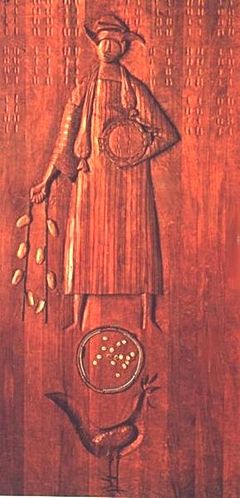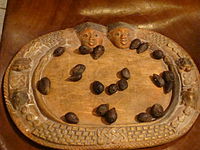- Orunmila
-
In the Yoruba religion, Orunmila is the Yoruba Grand Priest and custodian of Ifá. This source of knowledge is believed to have a keen understanding of the human form and of purity, praised as being often more effective than remedies; his followers and priests are known as Babalawo.
Contents
Mythical Orunmila
Among West Africans, Orunmila is recognized as a primordial Irunmole that was present both at the beginning of Creation and then again amongst them as a priest that taught an advanced form of spiritual knowledge and ethics, during visits to earth in physical form or through his disciples.
In Yoruba mythology, Orunmila is the spirit of wisdom among the Irunmole and the divinity of destiny and prophecy. He is "Igbakeji Olodumare" (second in command to Olodumare; often also playfully translated as "second calabash to God", since "igba" means "calabash") and "eleri ipin" (witness of fate). Orunmila is also referred to as Agbonniregun, the embodiment of knowledge and wisdom of Ifá.
In the Santeria/Lukumi diaspora in present-day Cuba, Orunmila is known as Orula & Orunla. Orunmila is not Ifá, but he is the one who leads the priesthood of Ifá and it was Orunmila who carried Ifá (the wisdom of Olodumare) to Earth. Priests of Ifá are called babalawo (elder of the confraternity) or Iyanifa (female Ifá priest).
Orunmila is considered a sage, recognizing that Olodumare placed Ori (intuitive knowledge) as prime Orisha. It is Ori who can intercede and affect the reality of a person much closer than any Orisa. For this reason it is important to consult with the Babalawo to know one's direction and the wish of one's Ori.
Etymology
Orunmila prononced Ọrunmila. It is generally accepted that this is a derivative of sort. Also known as Ela or Elasoode (Ela ties Ide on), one angle suggests that the ancient scholars interpreted as based on the verb "la". Explaining the meaning as "Ọlòrún-mọ-Ẹ̄la" (God knows Ẹ̄la).° Another, suggests that the name is derived from the phrase "Orun-ni-o mo eni-ma-la" (only heaven can identify the saved).
Priesthood and initiation
Awo in every tradition study the 256 Odù;[1] each Odù is an extraordinarily vast collection of knowledge, including stories and prayers that have been passed down from the time that Orunmila walked the Earth as a prophet, usually said to be about 5,000 years ago.
Some initiatory lineages have only male priests of Orunmila, while others include both genders. The term "Awo" is a gender-neutral title for an initiated priest of Orunmila. The debate surrounding gender is a result of diversity in the many layers of history in various locations. In some areas of Yorubaland and in Cuba, only men become full priests of Orunmila (sometimes nicknamed "Orula" in Cuban lineages), other places in Africa the priesthood has always been open to women (although female awo Ifa are relatively uncommon). In many non-Cuban lineages female Awo Ifa are becoming common. Women do not need to receive Odù because all women already have Odù which is represented by the womb of women and the female child-bearing ability; the womb is seen as both a physical and spiritual gateway between the heavens and the material world. Several Odù Ifá mandate that women do not see nor receive Odù (Calabash of Existence), and any claims that it can be given are easily dispelled; Ifá stanzas cite several reasons and occasions why. Odù is associated mainly with the force of creation as a gateway between the physical world and metaphysical world for the transfer of divine knowledge and messages. Throughout Cuba and some of the broader Santeria diaspora, Orula can be received by individuals regardless of gender. For men, the procedure is known as receiving "Mano de Orula" and for women, it is "Kofa de Orula." The same procedure exists in Yoruba land, with "ese n'taye" (birthing rites), "Ise'fa" (adolescent initiation rites) and "Ite'fa" (consecration of the paraphernalia of Ifá practice). Worshippers of the traditional religious philosophy of the Yoruba people all receive one hand of Ifá (called Isefa) regardless of which Orisa they may worship or be an Orisa priest. It is that same Isefa that will direct all followers to the right path and their individual destinies in life.
Iwa (Character) is one of or perhaps the most important human endeavor taught within Ifa literary corpus and every Ifa stanza (ancient poetic verse) has one portion dedicated to the issue of teaching the Iwa (Character/Behaviour) that Ifa supports. This Iwa, which Ifa teaches transcend religious doctrine is central to every human being, and imparts communal, social & civic responsibility that the Creator (Olodumare) supports. Central to this is the theme of righteousness[2] and practicing good moral behaviour, not seeking for it in the community but becoming the Ambassador of Iwa (Character).
The Yoruba believe in the duality in life: males exist because of the female essence and females exist because of the male essence, so every major rite or ceremony includes both genders. The traditional religious point of view includes similar privileges accorded to women as priestesses of Ifá and women's societies. A woman priestess is known as Iyanifa, Iyalaja, Iya Agba and Iyalase.
Female titles
- Iyanifa - A woman Awo Ifá; also a titled woman within an Ifá community. She can also be the Iyanifa present at the Itefa ceremony of any person, as the inclusion of women is mandatory at every male's Itefa rites.
- Ayafa - a woman who is married to a Babalawo and functions within rites & ritual of Ifa within family
- Apetebi - a woman who is married to a Babalawo and functions within rites & ritual of Ifa within a community & also her family
- Iyalaja - A spiritual mother working with Iya Nla.
- Iyanla - the Great Mother, also called Awon Iya mi (Our Mothers) and sometimes referred to as Gelede, the female masquerade commonly found in the Egba areas of Yoruba land and somewhat well preserved in Bahia, Brazil.
- Iya Agba - An old and wise woman.
- Iyalase - High Priestess and head of female society.
- Iyale - Depending on inflection or spelling, the term could either refer to the senior wife in a polygamous household (Iyá Ilé, or iyálé, when contracted) meaning "mother of the household"; or to a communal female personage who is a custodian of secrets and is therefore wise (Iyá Ilè, iyálè when contracted), meaning "Earth Mother".
See also
References
- ^ Odù (books) of Ifá
- ^ Ifaloju , Iwòrì Méjì: Ifá speaks on Righteousness, (an extract from S.S. Popoola, Ifa Dida, Library, INC) 2011
Resources
- Chief S. Solagbade Popoola & Fakunle Oyesanya, Ikunle Abiyamo: The ASE of Motherhood 2007. ISBN 978-09810013-0-2
- Chief S. Solagbade Popoola Library, INC Ifa Dida Volume One (EjiOgbe - Orangun Meji) ISBN 978-0-9810013-1-9
- Chief S. Solagbade Popoola Library, INC Ifa Dida Volume Two (OgbeYeku - OgbeFun) ISBN
- Chief S. Solagbade Popoola Library, INC Ifa Dida Volume Three (OyekuOgbe - OyekuFun) ISBN
- Charles Spencer King, "Nature's Ancient Religion" ISBN 978-1440417337
External links
Deities Supreme BeingCountries Nigeria · Cuba-Puerto Rico · Trinidad · Brazil · United States · Colombia · Venezuela · Mexico · BeninTopics Sacred sites Legendary figures Yorùbá Theogony OlódùmarèIrunmoleOrisaElderlyDisableYorùbá Categories:- Yoruba gods
- African traditional religions
- Afro-American religion
- Yoruba divinities
- Divination
- Wisdom gods
- Oracular gods
- Santería
Wikimedia Foundation. 2010.


